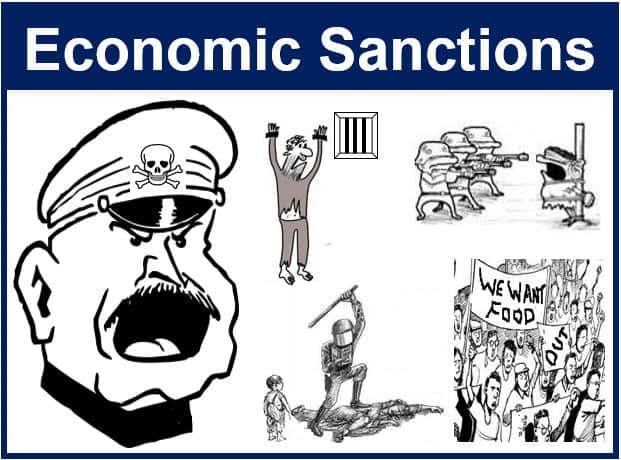Economic Sanctions are restrictions, i.e., a form of punishment, which a country or group of countries impose on another nation. The sanctions aim to persuade it to change policy.
The most common economic sanctions include trade barriers and refusing visas. Governments may also restrict financial activities.
An embargo may be placed on just one product, as occurred in the 1970s when OPEC imposed an oil embargo.
One country may impose sanctions because it believes another nation is trading unfairly.
Brazil introduced sanctions against the United States in 2010 because the American government was paying cotton farmers for their products, which Brazil claimed violated World Trade Organization rules.
The sanctions, which are still in place (July 2015), cover not only cotton, but also vegetables, fruits, cars, and chewing gum.
The country initiating economic sanctions may not necessarily have noble motives. It could well be using its economic might to coerce another nation into doing what it wants.

In recent years, Russia has threatened sanctions against neighboring nations to get them to comply with its demands.
According to the Council on Foreign Relations:
“Economic sanctions are defined as the withdrawal of customary trade and financial relations for foreign and security policy purposes.”
“They may be comprehensive, prohibiting commercial activity with regard to an entire country, like the longstanding U.S. embargo of Cuba, or they may be targeted, blocking transactions of and with particular businesses, groups, or individuals.”
Political leaders see economic sanctions as an alternative to military force, i.e., a less costly, less risky, middle course of action between diplomacy and all-out war.
‘Smart’ sanctions
Since the terrorist attacks by al-Qaeda on the United States on September 11, 2001, there has been a clear shift toward ‘smart’ sanctions. These are targeted sanctions which hopefully do not hurt innocent citizens.
Sanctions may include:
- asset freezes,
- trade restrictions,
- foreign aid reductions (or cancellations),
- capital restraints,
- arms embargoes, and
- travel bans.
Governments may use economic sanctions to advance a range of foreign policy goals, such as:
- cybersecurity (more recent),
- to resolve a conflict,
- import tariffs (to stop a country trading unfairly),
- to promote democracy and human rights,
- non-proliferation (to stop a country from developing nuclear weapons),
- counter-terrorism, and
- counter-narcotics.
Economic sanctions – Ukrainian crisis
After Russia intervened militarily in Ukraine in February 2014, several countries applied economic sanctions against individual people and companies. They also applied sanctions against officials from Ukraine and Russia.
Sanctions were approved by the European Union, the United States, Canada, Australia, other allied nations and international organizations.
Russia responded by imposing a total ban on the imports of food products from the US, EU, Norway, Australia and Canada.
Sanctions can also impact global markets and international relations, as they may lead to retaliatory measures and alter trade dynamics between countries.
The economic sanctions contributed to the collapse of Russia’s currency (ruble), its shrinking economy, and have probably cost EU businesses in excess of €100 billion.
After Russia invaded Ukraine in 2022, the US, EU, UK, and other allies imposed more and more economic sanctions on Russia.
Do economic sanctions work?
Experts across the world have failed to agree on whether sanctions are effective.
If the aim is regime change, they appear to be ineffective.
Despite the United States’ economic sanctions against Cuba, which have been in place for more than half a century, the same regime is still in power and people. Cubans still go to prison for expressing their thoughts.
In spite of several economic moves against Zimbabwe’s leader, Robert Mugabe, he remained in power for decades.
Most of the world has choked off trade with North Korea. However, the same quasi-feudal regime has run the country with an iron fist since 1953.
The BBC quotes Professor Adam Roberts, a research fellow at Oxford University and international relations expert, who said:
“There are very few cases where you can definitely identify sanctions as having had a success, except sometimes in combination with other factors.”
“Arguably they contributed something to the change in white minority Rhodesia that led to black majority rule; arguably the sanctions against South Africa were one factor that contributed to change there.”
However, Prof. Roberts insists that sanctions were only one factor, among several others, including guerrilla opposition in the country (South Africa) itself.
Prof. Roberts concluded: “So, it is impossible to say in either of these cases that sanctions were the decisive factor.”
A century of sanctions
Over the past century, there are have been many economic sanctions imposed by one country, a group of countries, or the United Nations, against another nation. Here are ten of them:
- United States vs. Cuba (1960-present): Trade embargo following the Cuban Revolution.
- United Nations vs. Iraq (1990-2003): Sanctions after Iraq’s invasion of Kuwait.
- United States and European Union vs. Iran (1979-present): Sanctions over hostage crisis and nuclear concerns.
- United Nations vs. North Korea (2006-present): Sanctions due to nuclear tests.
- United States vs. Russia (2014-present): Sanctions following Crimea annexation.
- League of Nations vs. Italy (1935-1936): Sanctions for Italy’s invasion of Ethiopia.
- United States vs. Japan (1940-1941): Sanctions for Japan’s aggression in Asia.
- United Nations vs. Yugoslavia (1992-1995): Sanctions during the Bosnian War.
- United States and European Union vs. Zimbabwe (2000s-present): Sanctions for human rights violations.
- United Nations vs. South Africa (1960s-1994): Sanctions against apartheid.
Ancient history
In 432 BCE, Athens imposed the Megarian Decree against Megara, restricting access to its markets and ports, escalating tensions leading to the Peloponnesian War.
The decree (economic sanction) severely affected Megara’s economy, as it closed the door on their access to essential trade and resources.
What are Sanctions?
This video, from our YouTube partner channel – Marketing Business Network, explains what ‘Sactions’ are using simple and easy-to-understand language and examples.
